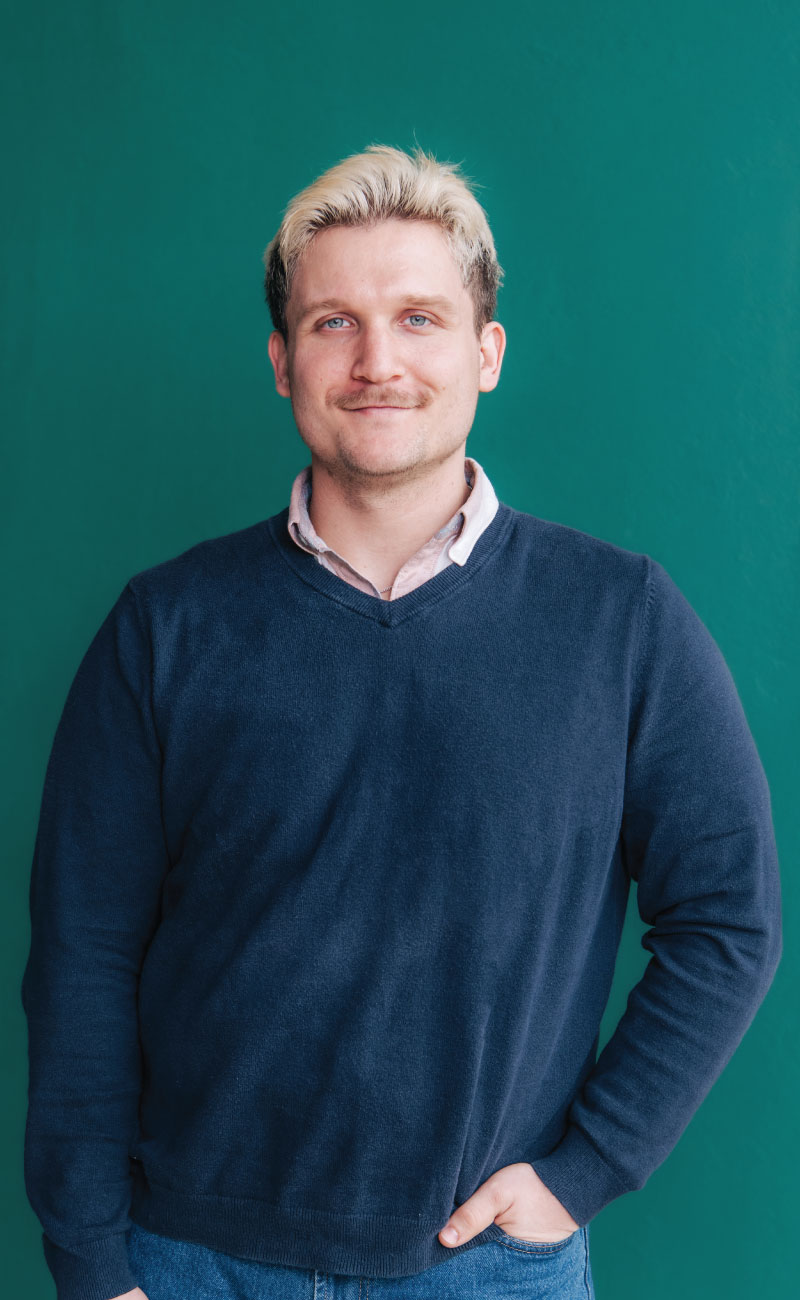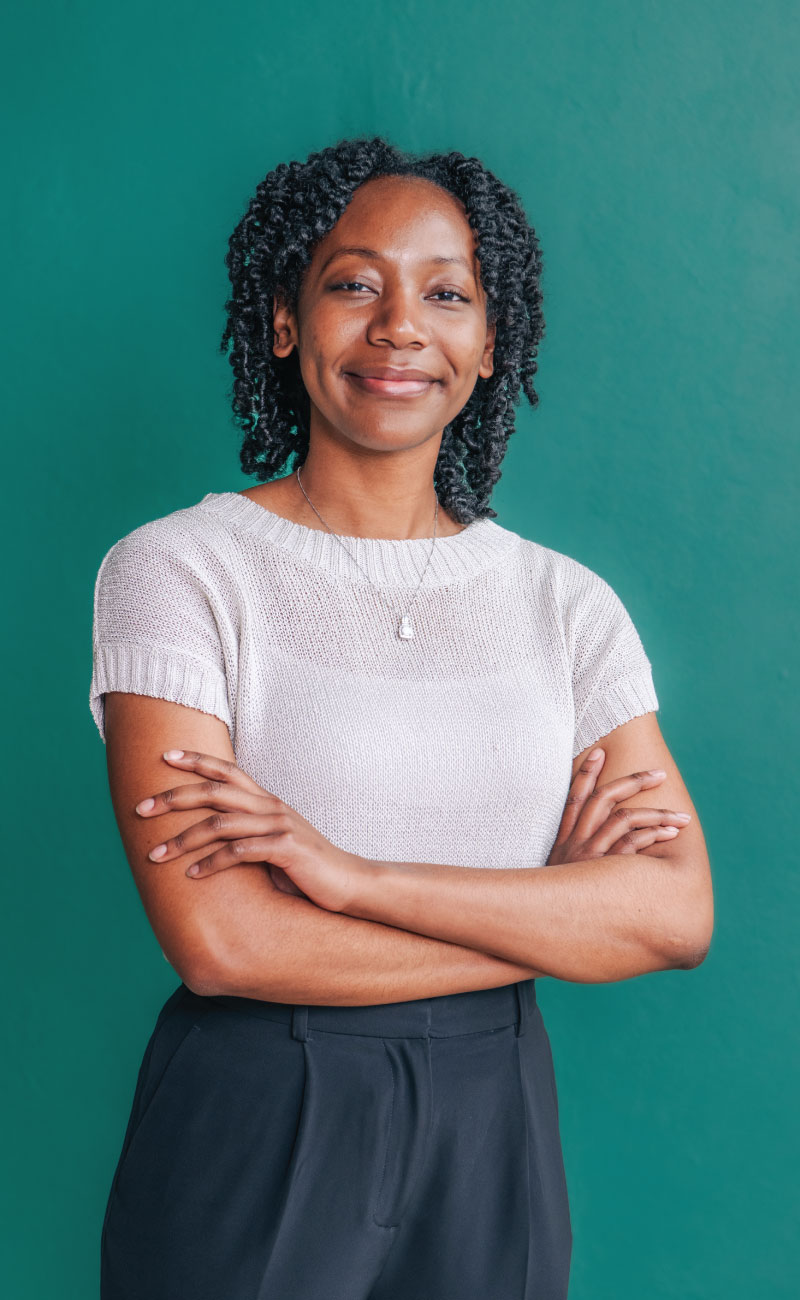 Federico Prokopczuk
Federico Prokopczuk
Federico Prokopczuk
Federico Prokopczuk is in his fourth year as an M.D./Ph.D. trainee. A native of Rancho Cucamonga, California, he graduated from California State University, Northridge with a Bachelor of Science degree in microbiology before joining the Heersink School of Medicine in June 2021.
Describe the research projects in which you have participated at Heersink.
I work in the lab of Carlos Orihuela, Ph.D., a professor in the UAB Department of Microbiology. My project investigates Pseudomonas aeruginosa, a bacterium that can cause infections in the blood, lungs, or other parts of the body after surgery, and a filamentous bacteriophage known as Pf, and how they affect each other during chronic infection of Pseudomonas aeruginosa. I am looking at the ways that this bacteriophage, which is a bacterial virus, can be making Pseudomonas better at infecting people long-term. Any infection with Pseudomonas aeruginosa can be incredibly damaging, but once the infection becomes chronic, it is incredibly hard to treat. Once this microbe gets in it does not want to leave and over time, this causes more and more complications, especially in people who are immunocompromised. Ultimately, this shortens the lives of people with the infection. If we were to better understand what Pseudomonas aeruginosa may be using to become chronic, like Pf, it could open up new ways of dealing with some of these infections.
What have you learned about your area of research and conducting research in general as a result of your research activities?
I had a background in microbiology going in, but one of the areas that has really become interesting to me is how microbes interact with each other while they are causing disease. It's fascinating to think that while we are trying to clear these infections, we may have some microbial friends that may be able to help us out.
In terms of conducting research, one of the things that has become clearer to me is that research training is more about the mindset than the techniques.
"It’s more important to think clearly about a question and approach it with the proper controls than it is to do the most wild and new methods."
How have mentors enriched your research experiences?
Dr. Orihuela has been incredible. He pushes me to be a better version of myself, and that can sometimes come with some hard conversations. There are times where I have had to come to him with bad results and that can be tough, but it's about continual growth. I also credit post-docs and other students in his lab for my mentorship.
I believe we should always be humble and teachable, and being in a good lab means being able to learn from everyone around you.
Have you published or presented your research?
I had a paper published in the journal mBio in 2023 (“Engineered Superinfective Pf Phage Prevents Dissemination of Pseudomonas aeruginosa in a Mouse Burn Model”). I have presented at multiple national conferences, most recently at ASM (American Society for Microbiology) Microbe 2024 in Atlanta, Georgia, and Southeastern Medical Scientist Symposium 2024 in Nashville, Tennessee.
How would you like for research to be part of your career moving forward?
Absolutely, I envision myself being a physician-scientist studying complex infections with a clinical practice in critical care and infectious disease. I want my research to inform my practice and my practice to inform my research. I couldn't choose just one, so I've decided to commit my career to both.
 Courtney Swain
Courtney Swain
Courtney Swain
Courtney Swain is a sixth-year M.D./Ph.D. trainee. Raised in Anniston, Alabama, she graduated from the University of West Florida with a B.S. in Biomedical Sciences in 2018. After completing UAB’s PREP Scholars Program in 2019, she joined the M.D./Ph.D. program In 2021, she joined the Graduate Biomedical Sciences program and the Cancer Biology theme for her Ph.D. training.
Describe the research projects you have participated in at Heersink.
I am in the lab of Lalita Shevde-Samant, Ph.D., a professor in the Department of Pathology and the associate director of Cancer Research Training and Education Coordination at the O’Neal Comprehensive Cancer at UAB. Our lab conducts breast cancer biology and immunology research.
My research involves studying a molecular pathway called Hedgehog signaling, which has been shown to drive the growth and metastasis of breast tumors. We also study how diabetes impacts breast cancer progression.
Specifically, the focus of my project is to better understand how Hedgehog signaling and diabetes impact a type of immune cell called T lymphocytes in breast tumors.
What have you learned about your area of research and conducting research in general as a result of your research activities?
My work has led me to learn skills and technologies, such as flow cytometry and bioinformatics, that will be valuable for my future career in medicine. I’ve also learned how to think critically and independently as a scientist. Altogether, I’ve received a strong foundation in research skills that will be very essential in my future clinical and research training.
How have mentors enriched your research experiences?
Dr. Samant’s mentorship has helped me thrive as a trainee as she continually challenges me to grow as a competent and independent cancer researcher. She also helps me strategically plan every step of my project and training, providing me with a more focused and hands-on research experience.
What inspired you to pursue research as a medical student?
I sought out medical training opportunities that would also allow me to have a dedicated research curriculum, as I knew this experience will be essential for me to achieve my career goals. I started my medical school journey as part of the M.D./Ph.D. program, which allows me to integrate Ph.D. training into my medical education with the goal of developing into a physician-scientist.
I have both family and close friends that have been significantly impacted by cancer. I’ve always felt a personal tie to the work I do as I feel empowered by the legacies of those I’ve lost, while also being inspired by those who continue to fight their battle with cancer.
I’ve also had the opportunity to present my work at both local and national meetings such as the annual O’Neal Comprehensive Cancer Center Retreat, the Southeastern Medical Scientist Symposium, American Association for Cancer Research Annual Meeting, and the APSA/AAI/ASCI Joint Annual Meeting. As I reach the end of my Ph.D. training, I am currently in the process of publishing and presenting the rest of my work in the coming months.
How would you like for research to be part of your career moving forward?
I will most definitely be continuing to pursue research opportunities in my medical career moving forward. It is my career goal to become an oncologist-scientist, a physician specialized in both cancer care and in conducting cancer research. Specifically, I would like to contribute to initiatives that will manifest into the development of new tools, technology, and resources that physicians and scientists can leverage in improving cancer care and research.
Caroline Davies
Caroline Davies is a Birmingham native who earned both a Master of Science in Biomedical and Health Sciences and a Master of Science in Anatomical Sciences from UAB. As a research project for her master’s degree, Davies and Inga Kadisha, Ph.D., associate professor in the UAB Department of Cell, Developmental and Integrative Biology, built digital tools to help students grasp the complex structures of the body, including a study tool for the Virtual Interactive Brain Atlas and a Virtual Anatomy Lab. Davies completed her second year of medical school in March 2025, and is currently taking a research year between the second and third years of medical school.
What inspired you to pursue research as a medical student?
Working with the pediatric neurosurgery team has expanded my interests to neurological disorders, surgical outcomes, and patient care research. I am particularly drawn to projects that address health disparities and patient-centered challenges. These experiences have reinforced my desire to pursue a career in academic neurosurgery, where I can combine clinical practice, research, and mentorship to improve both patient outcomes and medical education.
What have you learned about your area of research and conducting research in general as a result of your research activities?
Over the past year, I have gained invaluable experience in clinical and translational research in pediatric neurosurgery, particularly in patient-centered research coordination, including patient consenting, data collection, and interdepartmental collaboration. Applying research to clinical practice has been especially meaningful, as it has allowed me to better understand how disparities in neurosurgical care impact patient outcomes.
One of the aspects I appreciate most about these projects is the opportunity not only to learn in the operating room but also to participate in morning report and research meetings. Additionally, attending clinic and speaking directly with patients has deepened my understanding of patient-centered research and the challenges patients face in accessing care.
Through this experience, I have gained broad exposure to the pediatric neurosurgery specialty, from surgical decision-making to long-term patient care. Pediatric neurosurgery is unique in that it involves caring for patients who often have a wide range of intellectual and physical disabilities, many of whom are facing life-altering conditions. Witnessing how the team navigates these challenges with compassion, dedication, and innovation has had a profound impact on me.
How have mentors enriched your research experiences?
Brandon Rocque, M.D.; Jeffrey Blount, M.D.; Andrew Hale, M.D., Ph.D.; Anastasia Smith, DrPH, MPH; Betsy Hopson, MSHA; Jesse Jones, M.D.; and many other pediatric neurosurgeons and faculty and staff have provided invaluable mentorship, guiding me through both the scientific and professional aspects of research. Their support has enabled me to take on a research coordinator role, gaining experience in patient interactions, study design, and project management.
While I am excited to continue contributing to research, what truly motivates me to spend another year with this team (starting in May 2025) is the opportunity to continue learning from the people who make this work so meaningful. From my first few weeks, I was struck by how much I was able to learn—not just about research and neurosurgery, but about what it means to be part of a team dedicated to continuous improvement and patient-centered care.
More than just teaching me skills, they lead by example, demonstrating what it means to be not only a physician but a true provider—one who prioritizes collaboration, patient advocacy, and lifelong learning. I am incredibly grateful for the opportunity to continue working with them, and I know this experience will be instrumental in shaping my future career in neurosurgery.
How would you like for research to be part of your career moving forward?
I will most definitely be continuing to pursue research opportunities in my medical career moving forward. It is my career goal to become an oncologist-scientist, a physician specialized in both cancer care and in conducting cancer research. Specifically, I would like to contribute to initiatives that will manifest into the development of new tools, technology, and resources that physicians and scientists can leverage in improving cancer care and research.